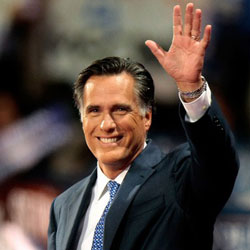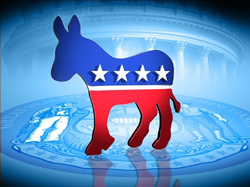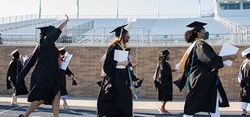With six months until Election Day, President Obama has taken a slight lead over his likely Republican opponent Mitt Romney. Although there is much time before November, this shows how the race will begin to take shape before the summer. Real- ClearPolitics.com has President Obama with an advantage of 3.2 points nationally over Romney, the former governor of Massachusetts. That calculation takes into account national polls from various polling institutions.
However, looking at the Electoral College gives President Obama even more reasons to be optimistic. No matter what the polls say about each candidate or their approval rating, you still need 270 electoral votes to become the Commander-in-Chief. Taking a look at the electoral map shows that the President currently has a distinct advantage. Counting states that are ‘safe’ for each candidate, (winning by 15 points or more); Obama already has 161 electoral votes to Romney’s 131. Add the states that are leaning for each candidate (15 to eight point advantage) Obama increases his lead 227-170. That only leaves the toss-up states, or those that are within eight points for either candidate, left to determine the winner. 11 states currently fall into this category. They account for 141 votes each with Obama needing only 43 of those to win.
A closer look at the toss-up states sees Obama with a lead in a majority of them. Florida’s 29 votes are currently in the president’s column with a 4.2 point lead over Romney, taking the vote count to 256. Obama is also leading in Pennsylvania by six. A win in Pennsylvania and Florida will see the President going over the 270 threshold and winning reelection. Romney could win the remaining nine toss-up states and still lose. In fact, the only toss-up states that are currently red for Romney are Arizona by 5.4 and Missouri by three. The President also sees a 5.3 point lead in Ohio, a traditional battleground state. There are many different ways Obama can win from the tossups while Romney would need to steal many of the states that are currently blue.
These numbers, of course should be taken with a grain of salt. Six months seems like an eternity in the political world and anything can happen between now and November to change the entire dynamic of the presidential race. In 2004, six months before the Presidential race, many polls including CNN had John Kerry beating incumbent President George Bush by five points. There were also times during the 2008 election where McCain was beating Obama by as many as five points in Gallup and USA Today polls.
Dr. Thomas Lamatsch, Assistant Director of the Monmouth University Polling Institute, would argue that it is too early to start making predictions. He states, “It is way too early to make a prediction,” he continues, “So many things can happen until November that the race is wide open, not only statistically speaking but also from a political perspective.” You could also argue then that this could also turn for the president in that the economy could boom in the upcoming months and his poll numbers could soar through the roof. This summer will be crucial for both campaigns, especially the highly publicized vice presidential nominee of Mitt Romney.
Taking into account the fact that it is way too early to predict, it is still very important and interesting to discuss the November elections. Many throughout the political spectrum are saying this election will be one of the most important ever. The United States is facing many problems, the likes of which we have never seen before. The president who is selected will determine how and if we tackle these issues. The deficit and the economy will most likely be the biggest issue in 2012. A Rasmussen poll from March 4 shows that 82 percent of Americans believe the economy is a very important issue. President Obama will need to convince voters that he has led the economy down the right path. If the President can show that we are better off now than it was in January 2009, when he took office, he will have a much easier job keeping control of the White House. Mitt Romney will need to argue that he has the answer to fix the economy. Republicans believe that the economy is growing, but not fast enough.
Mitt Romney, the presumptive nominee, will need to excite his own political base to have a chance in November. Many accuse him of being too liberal to be a representative of the Republican Party, which is moving further to the right. In 1994, Mitt Romney was pro-choice while running for Senator of Massachusetts against Democrat Ted Kennedy. He has since changed his position to be strictly pro-life. He has been for gun control and tried to be a champion of gay rights according to massresistance.org. These are positions which do not align with the conservative or the Tea Party movement.
Junior political science major Brad Landau believes this has caused a split in the Republican Party. “The Tea Party movement showcases how divided the Republican Party really is,” said Landau. If Romney can unite the Tea Party with his campaign and show that the President’s policies are not working he will have a much greater chance in November. If President Obama can successfully argue that America is better off now than it was in 2008, he may not have to move his things out of the Oval Office just yet.




